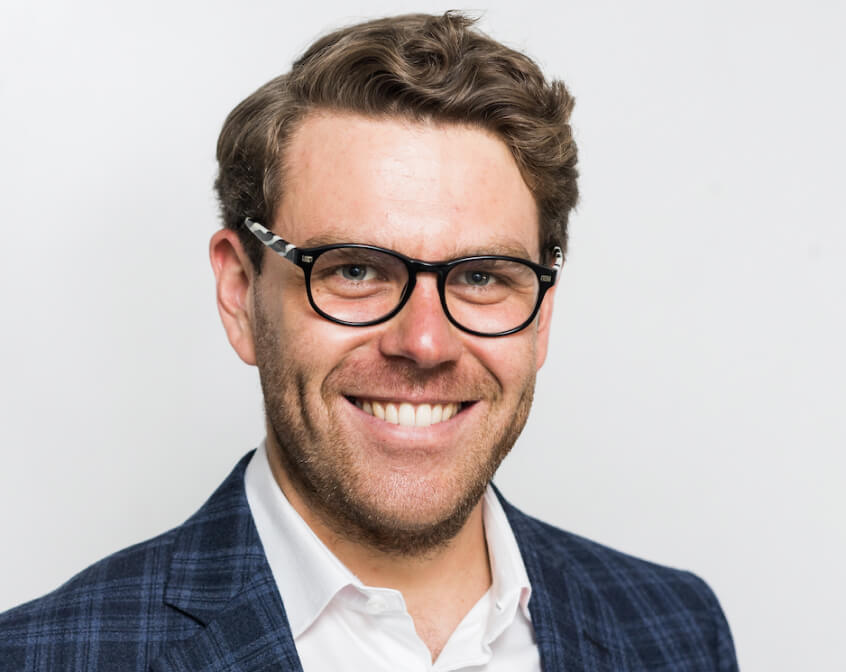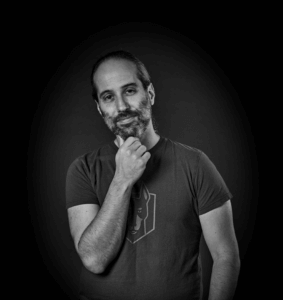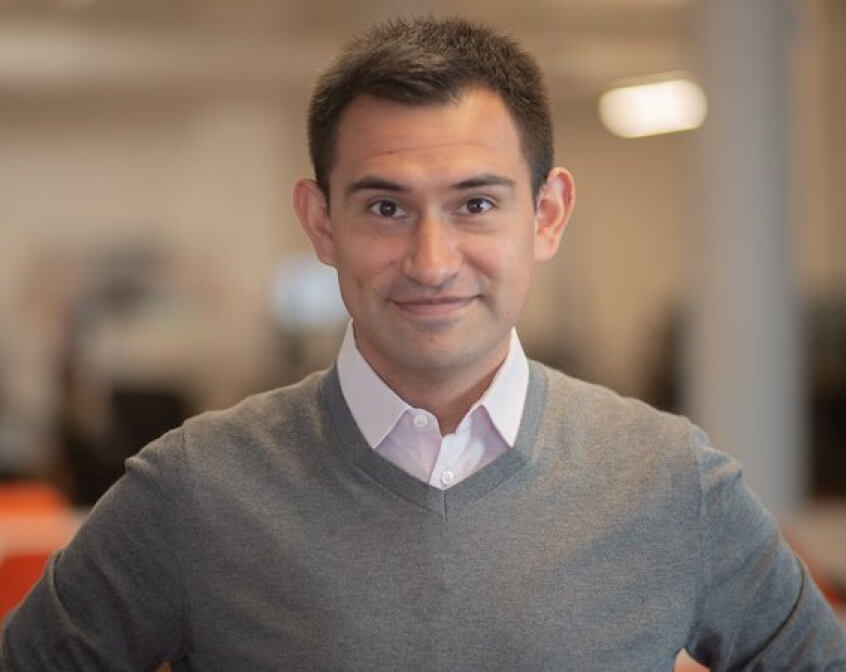Spenser Skates is the co-founder and CEO of Amplitude, a publicly-traded software company that offers the leading digital analytics platform. Today, Amplitude’s software is synonymous with product management, with thousands of customers ranging from startups to NBC Universal, Capital One, Dropbox, and Atlassian, including over a quarter of the Fortune 100. But it wasn’t always that way. In fact, Amplitude was founded as a spin-off of Spenser’s previous startup, Sonalight.
Over the last decade in moving from building Sonalight to building Amplitude, and scaling the company to hundreds of employees along the way, Skates has encountered and overcome significant operational challenges faced by many founders, ranging from product building to scaling go-to-market strategies.
As part of our founder interview series, Crew Capital’s Co-founder, Daniel Dines, sat down with Skates to have a conversation about his journey that led to building Amplitude into the defining digital analytics company.
Watch also the video version of the interview!
The path to becoming an entrepreneur
While studying bioengineering at MIT in 2010, Skates wrestled with profound questions about his life’s direction and a desire to create something that would contribute positively to society. Opportunities to learn new skills were plentiful, and Skates was considering a number of disciplines – from finance to consulting, to joining a big tech company. Immersed in his classes at MIT with peers consisting of talented students and aspiring entrepreneurs, and inspired by stories of successful innovators and writers like Norman Borlaug and Paul Graham, Skates became passionate about the potential of technology to make a meaningful impact on society.
“I read a lot of Paul Graham’s writings and looked at the paths of different successful companies. One of the things I realized was that building a successful company is an incredible way to impact the world.”
Skates dug deeper and discovered Norman Borlaug, an American agronomist who led initiatives worldwide that contributed to the extensive increases in agricultural production that became known as the Green Revolution. For Skates, Borlaug’s story functioned as a practical inspiration on how technology can, quite literally, change the world. “Borlaugh’s impact on millions of people was an incredible thing to understand. And so, to me as an impressionable 21-year-old, it was incredibly inspiring. I was astounded by how he totally changed the game with technology.”
As Skates’ strengths didn’t lie in food production, he decided to apply Borlaug’s lessons to a domain he was more familiar with: software.m“I thought to myself that if only by just a tiny fraction, I can have the impact Borlaug had on human society, I’m going to be really happy with what I did with my life. So I asked myself: in which domain can I make an impact?”
As Skates continued studying the industry, it quickly became clear that building his own company was the best way forward. He eventually convinced his MIT fellow student Curtis Liu – today the CTO and co-founder of Amplitude – to come along for the ride. The two founded their first company, Sonalight, in 2011.
Build a product your customers want
At Sonalight, Skates was faced with a problem that many founders face: they were not engaging enough with their customers. Skates and Liu were fixated on creating an outstanding product from an engineering perspective but failed to address the actual needs of their customers. The lack of sufficient attention to customer feedback became a serious problem. “We spent a lot of time building products because that was what we knew how to do and that was what we were comfortable doing as two engineers, and we knew how to solve engineering problems.”
When Skates and Liu started Amplitude in 2012, learning from their experience at Sonalight, they decided that for Amplitude, they would talk to at least 30 potential customers before building anything. Meanwhile, Skates moved from product to sales. Skates highlights the importance of founders connecting with their customers to truly grasp the demands of the market. “I hired a sales coach who helped us out one day a week and taught me the basics of how to sell, how to qualify, how to ask the right questions, and how to focus on customers that have the right problems.”
“One important piece of advice I would offer to technical founders who lack sales experience is to get a mentor or a coach, or someone who’s built a business before, because then they’re going to give you the feedback and advice you need. Particularly if you’re an engineer, your instinct is going to be to focus on problems you can solve, which is how to build a product. But what’s even more valuable is the understanding of what product you should build – and this can only be achieved by talking to your customers,” Skates says.
Learn continuously and know when to ask for outside help
Once Amplitude reached a few million dollars in annual recurring revenue, the main focus shifted to hiring and building up the right team. Skates paints a picture of a multipronged approach to scaling the business and managing team dynamics. “Once you get product-market fit and you understand the customer, it’s all about scaling.”
According to Skates, the next major challenge for a founder to grapple with after achieving product-market fit is managing and scaling the company’s organizational structure. “I’m still learning a lot as a CEO, but one of the biggest lessons is, as an entrepreneur, particularly a first-time entrepreneur, you’re not going to be familiar with how to scale an organization.”
This is when Skates suggests that seeking external assistance becomes crucial for early-stage founders who are scaling a company for the first time. Every founder will inevitably hire an experienced executive. Achieving the right balance between following one’s instincts as a founder and embracing new advice becomes paramount for success. “As an example, you might feel pressured to adopt transparent pricing based on its success in other companies. However, as a CEO and founder, it’s crucial to trust your instincts and acknowledge that what works for others may not be the best fit for your own company.”
Founders should engage in an ongoing process of questioning, both internally and externally. They should consider various aspects, such as how to establish a well-structured sales team, create an effective hiring process for engineers, define company goals and strategy, and manage financial operations. “Bringing in that knowledge from the outside versus having to learn it yourself makes the process several times faster.”

The loneliest job in the world
Acknowledging Skates’ emphasis on the importance of bringing in support to scale a startup in terms of its team and organizational structure, Daniel Dines agrees and notes that it becomes all the more important that CEOs possess the ability to make tough decisions. “We know deep inside us what is the right decision, but it is hard because sometimes our kindness and our weaknesses block our ability to make the right decisions.”
This, according to Dines, is what makes the role of CEO the loneliest job. The role of CEO – which both Skates and Dines have years of experience in – demands a level of unwavering focus and an ability to convince different parties to commit to goals even during intense disagreements.
Skates believes that the direction of the company and determining the reporting structure are two fundamental aspects crucial to the role of CEO. “To go from an entrepreneur who has an idea and an insight, to a leader of a fast-growing organization is a hard transformation. As CEO there are two aspects that only I can determine: Where the company is going and who reports to me.”
In addition to the operational duties, Skates believes in having a strong emotional support system. Sometimes the cofounders fill that role, as has been the case at Amplitude. But the support environment must go beyond the company. Here, Skates refers to his wife who, before getting married, expressed her commitment to supporting Skates’ wish to build a successful company and the many sacrifices this would require.
Embracing a sales mindset
For Dines one of the main lessons learned was not to just build sales, but to love sales. “If you don’t love something that you’re doing, you are not going to build something great. That’s the process, and humility has a lot to contribute to it.” In terms of building a sales team, especially in B2B, Dines states that “you need amazing salespeople because they convey the product message in simple terms, and can inspire our customers.”
Skates agrees, explaining that Amplitude has been intentional in embracing a sales mentality as part of the company’s DNA and corporate culture.
Creating alignment and celebrating success
Skates says that he has been very deliberate about creating synergies between his sales and engineering teams, and that a close alignment between the two core functions has been really strong in Amplitude since day one. “We have been very intentional about having that culture where our engineers celebrate account executives closing great deals, and then vice versa. Our sales team knows that the reason they’re able to be so successful is because the engineering team has built such an incredible product.”
Building and scaling a company comes down to culture
Among the things Skates & Dines have in common as startup leaders is their emphasis on humility as a company value. Skates explains, “Our expectation is that in any conversation, your approach is one as an individual who wants to learn and hear about the perspectives of other team members, and the data points they share.”
Dines emphasizes that the key to establishing that level of humility and shared trust in a team, is not merely hiring based on a candidate’s resume, but rather identifying candidates who are well-aligned with the company’s culture. “Culture for me is like a framework – it’s in every decision,” Dines explains. “Similar to humility, it’s in every decision. We have the mindset that humility is an aspiration that we never fully can achieve, but we aspire to.”
At Amplitude, Skates employs three sets of values that form the core of the company: humility, ownership, and a growth mindset. “Particularly for culture values, the real value is extracted from how deliberate and determined you are about scaling them as part of your processes. Are those values part of your hiring process? Are you deliberate about including them in your performance review and promotion process? And what about if someone is not a fit to those values?”
Skates emphasizes the importance of these core values as part of every aspect and interaction. They should be celebrated and promoted across the organization.
Related Articles

Scaling the SaaS Ladder: Subskribe CEO Durga Pandey on Navigating from Seed to Growth Stage
Coming off a breakout year for Subskribe, Crew Capital’s Dylan Reider and Sonia Damian sat down with Durga Pandey to…

Jake Stein: Lessons from a repeat founder
Jake Stein’s experience as a serial tech entrepreneur makes him the perfect person for us to speak with, regarding the…








